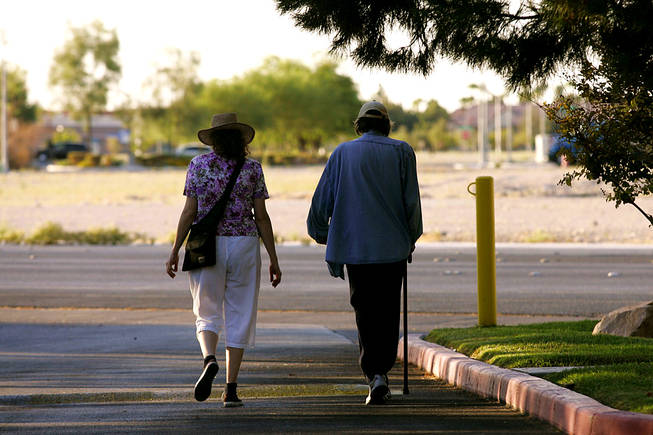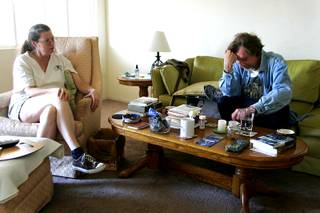
Sam Morris / Las Vegas Sun
After vacating their house and moving into an extended stay hotel, Lela Michael and Rodger Jacobs head across the street to a Denny’s for dinner August 31, 2010.
Sunday, Sept. 26, 2010 | 2:01 a.m.
The New Homeless: Part 1
The New Homeless:Pt 2
Disabled freelance writer Rodger Jacobs and his girlfriend Lela Michael, a freelance editor, moved to Las Vegas in 2007 to care for Jacobs' ailing mother. On the second anniversary of his mother's death, Jacobs and Michael are packing all their belongings and moving to a weekly rate residential hotel. The Sun ran the first video of this series on August 29, 2010, when a judge gave them seven days to vacate their house because they could not pay their August rent. Now, a stranger's help gets them out in time, and the couple adjusts to their small new living quarters and deals with backlash from the reaction to the first installment of their story.
The New Homeless: 5-Day Time-Lapse
Disabled freelance writer Rodger Jacobs and his girlfriend Lela Michael, a freelance editor, fall behind in their rent and are forced to pack up and move into a room at a weekly-rate residential hotel in North Las Vegas. This time-lapse photography, taken over five days, is a snapshot of their unpacking and daily routine in their new cramped quarters.
The New Homeless:Pt 1
Rodger Jacobs and his girlfriend Lela Michael have only lived in their North Las Vegas home for five months, but they have fallen behind on rent and face an eviction hearing Monday, August 23, 2010. Jacobs, 51, is a freelance writer who has had trouble finding work during the recession. Jacobs' cousin owns the house and charges $1,050/month, but the couple will soon be moving into an extended-stay hotel where they can pay $200/week to save money.
How you can help
Financial contributions for Rodger Jacobs will be accepted at any U.S. Bank branch.
For information helping the homeless, contact helphopehome.org, which coordinates with various Southern Nevada agencies to assist individuals and families achieve stable and sustainable lives.
Donations to the Southern Nevada Homeless Trust Fund can be made through the United Way of Southern Nevada (uwsn.org, or 734-2273).
For volunteer opportunities, contact the Volunteer Center of Southern Nevada at 892-2321 or at volunteercentersn.org.
Sun archives
- Couple looks to future after leaving desert homeless camp (7-25-2010)
- As economy sinks, demand for social services soars (7-25-2010)
- Battered women of recession (7-19-2010)
- Las Vegas jobless rate soars to 14.5 percent (7-19-2010)
- The faces of the recession in Las Vegas (12-28-2009)
- Count finds 17 percent increase in homeless population (4-9-2009)
- LV City Council addresses homeless issues (3-18-2009)
- Volunteers seek out valley's homeless for census (1-29-2009)
- Volunteers turn out to help homeless (12-21-2008)
This is the second installment by writer Rodger Jacobs, sharing his experience as one of the new homeless in the Great Recession.
With my freelance writing opportunities all but dried up and unable to afford the rental of my cousin’s home in North Las Vegas, Lela and I now find ourselves at a sort of way station, the Budget Suites of America along the urban trench near Rancho Drive and Smoke Ranch Road.
It is a sprawl of economically depressed off-Strip casinos, fast-food joints, gas stations, choking bus fumes, the rush and scramble of humanity, the insolence of the street beggars, humble yet aggressive (“Hey, cuz, gimme a cigarette … c’mon, I know you got one, man.”). In the beer and wine cases at the Terrible Herbst market on the corner, MD 20/20 and Cisco are offered at $3.99 a bottle, cheap but highly effective booze (Cisco is 13.9 percent alcohol) that is recognized as the preferred beverage of Skid Row denizens in my hometown of Los Angeles.
In fact, returning to L.A. is now our goal — hopefully, by Nov. 15 — because it surely will offer a more supportive environment, where we have a reliable social network and greater opportunities in general. We have little hope of sustaining ourselves in Las Vegas, although some locals have been extremely generous in offering financial support since the first installment of the New Homeless was published in the Sun four weeks ago (thanks to U.S. Bank for setting up the special donation account). I have received several possible freelance writing assignments, and Lela has received some editing work.
But a friend of mine, who has worked with the chronic indigent, warned me about baring my predicament in the newspaper. I should brace myself, he predicted, for a cold shoulder.
“People are uncomfortable with and hostile toward the topic of homelessness,” my friend Joseph Mailander cautioned. “More often than not, they want to believe that the homeless got in their situation because of mistakes that they have made rather than confront the uncomfortable truth that fate is often random and undeserved and homelessness could happen to anyone in the blink of an eye.”
The day the Sun published my essay — which was intended to illustrate how close many of us are to being homeless in the Great Recession — I had planned to spend packing. Instead, I spent many of my waking hours defending myself against allegations of sloth (“30 years of not having a real job”), hypochondria, arrogance (“Your arrogance got you where you are and will keep you where you are”), weak moral and ethical judgment, prevarication (“Writers are liars and opportunists”), alcoholism, drug abuse, liberalism, solipsism, atheism (“Christ was homeless … read the Bible … take up your cross and follow the Lord”), ripping off “the system,” a defeatist attitude, poor money management, a grifter looking for a handout, and, oh yes, I need to stop smoking, get a haircut, and “renounce (my) citizenship, become a Mexican citizen and then come back as an illegal and qualify for free housing, food stamps, and medical coverage and live off the fat of the land.” (How chilling that the last comment unintentionally invokes John Steinbeck in “Of Mice and Men,” perhaps the greatest literary defender of America’s downtrodden.)
Who wouldn’t be distracted from their responsibilities by such loathing and shrill white noise? (Incidentally, I have not quit smoking, but I did get a haircut — from a kind Wal-Mart beautician who was recently homeless with two teenage sons to care for. I did not ask what “mistakes” she made that put her in that perilous position.)
Two days before the article appeared, Lela placed a classified ad on Craigslist offering all of our home furnishings for sale in an effort to downsize to a small storage space; on Friday there was one taker for my new office chair — five bucks cash — and no other offers. Saturday, Lela placed a new ad offering our furnishings for free and the phone never stopped ringing with calls from eager takers, and every one of them, when they arrived to escort our belongings out the door, was a snapshot of economic despair: a man with an apartment but “not a stick of furniture,” a young woman with a baby in tow, her husband having shipped off to Afghanistan (she gladly took our dining room set) — perhaps the man should have rented a furnished apartment and the young lady shouldn’t have married a soldier during wartime; but it’s not my place, nor anyone else’s, to render such judgments. They’re hurting bad enough as it is and I was gratified to see my possessions going to people who needed them.
On the eve of having to vacate the house — which was also the second anniversary of my mother’s passing, the tragedy that brought us to Las Vegas from California — most of our furniture was gone but dozens of boxes of books, files, medical paperwork, and personal belongings would have to be put in storage; we had cash on hand for the first week at the Budget Suites and the storage space was within our projections, but we had no money to rent a truck or hire movers, not if we expected to eat; with stunning regularity, groceries and prescription co-pays have exerted an inexorable influence on our budget planning.
As Lela laboriously stuffed goods into boxes, my anxiety began to mount. Under Nevada landlord-tenant law, if we did not remove every personal item from the property by 5 p.m. Aug. 31, the management company reserved the right to pack everything up, put it in a storage facility of its choosing, and charge us any rate it pleases. We were 26 hours away from this unthinkable option becoming a reality.
All I could do that afternoon was field phone calls from people with potential freelance work and helplessly watch Lela pack; my psoriatic arthritis limits the amount of physical labor I can do. One of the comments in the original Sun article, comparing my condition to “a hangnail,” represents common public ignorance about psoriasis and its arthritic byproduct. Psoriasis is not a skin disorder, it is an immune system disorder with serious side effects. I am plagued by tendinitis, enthesitis (pain and swelling where tendons and ligaments attach to the bone) and I am exhibiting symptoms of severe joint degeneration in my hands and feet. I live with pain 24/7.
I walk with a cane, sometimes I have to use an electric wheelchair that Medicare provided last year when I was under home health care by a nurse service, and my toenails and fingernails have been eaten away by the ravages of psoriatic arthritis, leaving exposed flesh with sensitive nerve endings. I cannot help Lela pack, let alone avail myself of “menial labor” jobs that so many respondents in this paper excoriated me for refusing to do should such offers come my way.
Imagine life without fingernails and toenails and then ask again why I’m not working at McDonald’s. Under the strict definitions of Social Security disability, my “condition interferes with (my) basic work-related activities” and I “cannot adjust to other work.” And getting approved for Social Security disability was no rubber-stamp affair: It takes eight months to one year and requires the applicant to avail himself of food stamps and all state aid remedies while awaiting approval — it is a humiliating and humbling process.
The day before we had to move out, a kindhearted representative of an independent organization called the Fallen Angel Factory (requesting anonymity) contacted me via the Sun to donate moving and storage services on the day of our move-out, an offer that we wholeheartedly seized upon.
By sundown the next day we were ensconced in our cramped one-bedroom affair at the Budget Suites. It’s a far cry from the suburbs and exurbs of Las Vegas that we are accustomed to, but we have a goal in sight — to be out of Southern Nevada by Nov. 15 — and that makes our situation seem temporary and tolerable.
In the next two to three weeks, Samizdat Press will release a nonfiction book, “Jack London: San Francisco Stories,” which I collaborated on with Matthew Asprey, a creative writing instructor at Macquarie University in Sydney. It is a groundbreaking work that I have a percentage stake in. My fingers are (painfully) crossed that the book will attract attention in both the academic and commercial world of publishing, leading to modest sales and more work offers in the field of journalism that I enjoy the most, literary essays.
But life in a residential hotel is far from ideal, and it has offered me a ground’s-eye view of the full effect of the Great Recession, from entire families crammed into small rooms and a school bus that drops off dozens of children in front of the hotel on weekday afternoons.
Every day at 3:30 I walk to the Terrible Herbst on the corner of Rancho and Smoke Ranch to buy a few snacks and a bottle of water for the evening. My path converges with the path of the schoolchildren, backpacks and textbooks in tow, their voices loud and cheerful as they scatter across the sprawling grounds of the Budget Suites. So many families live here, so many people struggling as I am, and I cannot help but feel that we are invisible to the community at large.



Join the Discussion:
Check this out for a full explanation of our conversion to the LiveFyre commenting system and instructions on how to sign up for an account.
Full comments policy